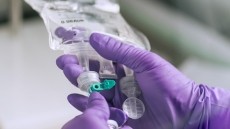VGX strengthens its plasmid position
the plasmid DNA area with the award of two new patents covering the
use and manufacture of plasmid DNA.
The first of its two new US patents, entitled "Device and Methods for Biomaterial Production", covers a new production process for plasmid DNA and the second covers the use of a plasmid that encodes for growth hormone releasing hormone in the treatment of anaemia. The new approach aims to overcome the problems involved with isolating plasmid DNA from a bacterial host and will be used in the company's development of its own drug candidates as well as for contract manufacturing. According to Dr Niranjan Sardesai, vice president of Product Development at VGX Pharmaceuticals the production patent covers a "fundamentally different process for producing plasmid DNA in large quantities". He explained that on a bench-top scale there are a large number of choices of how the plasmid DNA is purified and recovered from the host bacteria, but on process scale-up the lysis step can become difficult and lead to low yields. "The patent describes a process that smooths out the process of recovering the plasmid DNA using a high shear- low residence time mixing step to lyse the cells followed by a proprietary mixing process to clarify the lysates," said Dr Sardesai. The low residence time is crucial when using a high shear lysing process as a long residence time will reduce the yield of the plasmid DNA as genomic DNA from the host will be sheared and contaminate the product leading to losses due to the need for increased product purification. The lysis step is conducted under alkaline conditions and according to Dr Sardesai neutralising the system quickly is important if high yields are to be reached as the conditions can degrade the product. "The innovation in our process for this step is that we use a bubble chamber to sparge the neutralisation with air which ensures efficient mixing of the neutralisation reagents and increases product yields," he said. Because the process avoids the shearing of genomic DNA and the alkali lysis removes endotoxins the purity of the products is such that the products don't need to be polished using chromatography columns or resins, but rather by a membrane-based filtration process. VGX are currently in licensing discussions with several potential partners to get the technology into the market. The second patent covers the use of a plasmid that encodes for growth hormone releasing hormone (GHRH) to treat patients suffering from anaemia and cancer cachexia. Anaemia is a disorder of the blood caused by a deficiency of low red blood cells and haemoglobin and can be associated with HIV and cancer. VGX are trying to counter this by delivering a plasmid that encodes for GHRH via in vivo electroporation to control the release of growth hormone and form new red blood cells. "We have found that you can regulate IGF-1 [insulin-like growth factor] levels and growth hormone levels by administering GHRH in a DNA based form," said Dr Sardesai. He was quick to point out that other people have conducted studies where they have administered GHRH directly as a protein therapeutic to increase the production of red blood cells. Unfortunately, GHRH has a short half-life of between 30 to 60 minutes making the treatment impractical. "The advantage of using a DNA based delivery is that you can maintain steady state levels of GHRH because the cells express the protein," said Dr Sardesai. The company is currently in the process of finishing preclinical studies on the process and plan to make an IND (investigational new drug) application to the FDA (US Food and Drug Administration) early next year.










